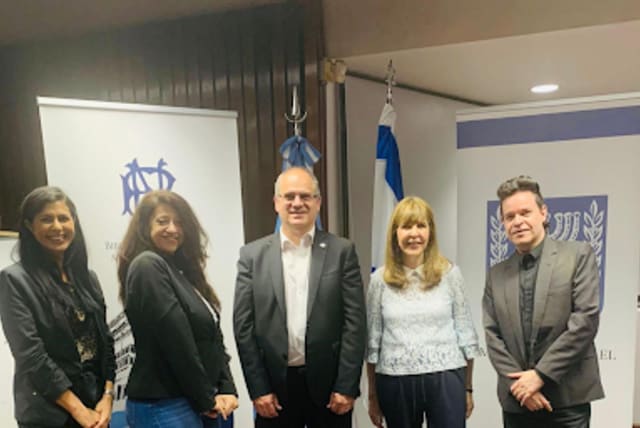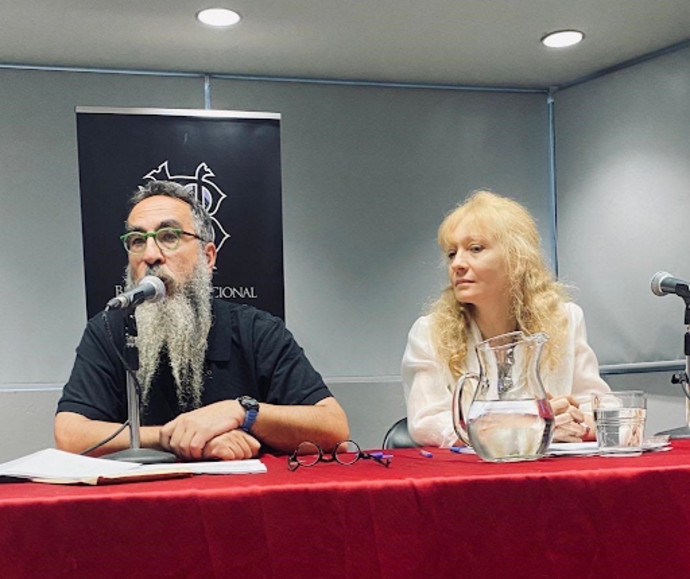National Library of Argentina showcases Borges’ love for Israel and Judaism

Argentina’s National Library in Buenos Aires devoted the whole month of November to the theme “Jorge Luis Borges and Israel.” The initiatives organized by the library in cooperation with the Embassy of Israel in Argentina included several lectures and an exhibition.
“Few people in this world managed to synthesize substantial aspects of Jewish and Israeli culture in the Spanish-speaking literary work like Jorge Luis Borges,” said Ambassador Eyal Sela. “As the representative of Israel in Argentina, I am moved by reading this other ambassador who has known how to bring our peoples closer with bridges of unique and perpetual words.”
Argentine-Israeli Professor Ruth Fine, who is Salomon and Victoria Cohen Professor in Iberian and Latin American Studies at the Hebrew University of Jerusalem, held several lectures. Among others, she covered the topics “Israel, Judaism and Borges” and “Dedication of a silence: Borges’ forgotten poem.” Dr Saul Sosnowski from the University of Maryland related Borges with Kafka, and discussed their shared influences and their legacy. The closing conference was held by Rabbi Daniel Goldman and Maria Gabriela Mizraje, a Borges specialist. It focused on the writer’s relation with the state of Israel and with Judaism, and how both of them appear in his poems across the decades.
The exhibition was curated by Laura Rosato and Germán Álvarez from the Jorge Luis Borges Center for Studies and Documentation. It was organized around major themes that included the author’s family and personal life, Jewish mysticism, philosophy and the Kabbalah, Borges' points of contact with Jewish culture and Israel. The exhibition featured gigantographies, texts and books belonging to the personal library of the author and to the Library's collections.
The section devoted to the personal life of Borges focused on the Jewish origin of his maternal family, the deep imprint of Rafael Cansinos Asséns, the friendship with Argentinian Jewish intellectuals and his visit to the State of Israel on the occasion of receiving the Jerusalem Prize in recognition of his intellectual work.
The exhibition also showcased his readings and interpretations of Baruch Spinoza and Martin Buber, as well as his interest in Jewish mysticism and Kabbalah. Also, the fundamental identification with Kafka as a writer's model and the concept of his literary precursor were included in the display. From the traces of ancient themes in Borges' literature, the exhibition explored Borges’ way of writing, the appropriation of names, figures and mythologies of this culture and its assimilation to the environment of Buenos Aires.
“The word 'dialogue', through Buber's philosophy, represents the relationship that man has with God, that is, in the Torah, when the commandments are revealed, it is the communication that Moses receives from God: the dialogue between nations, the dialogue between God and man,” said Rosato and Álvarez.
Five years ago, the Embassy of Israel re-edited a book featuring everything Borges ever wrote about Israel and Judaism, to mark 70 years from the establishment of the state of Israel and 50 years from Borges’ first trip to the country.
“This project that we are carrying out with the National Library is a wonderful opportunity to strengthen our binational ties and allow the public to get closer to an ancient culture from the pen of an incomparable author," said Ambassador Sela.


